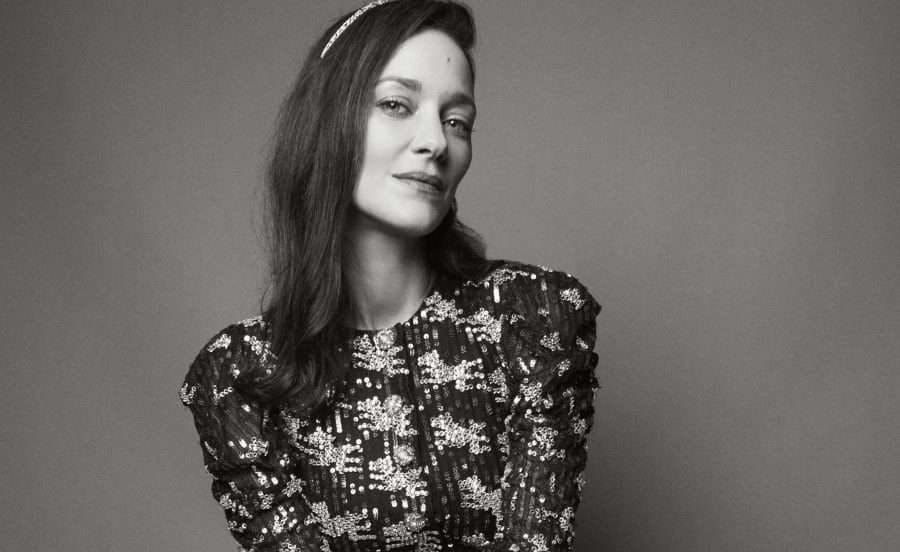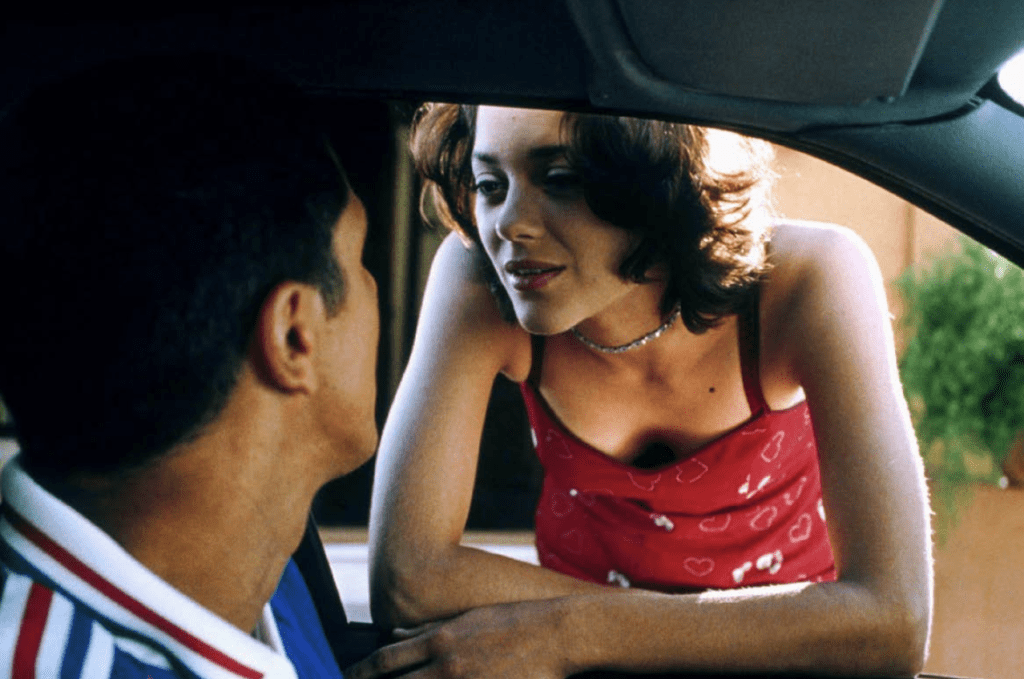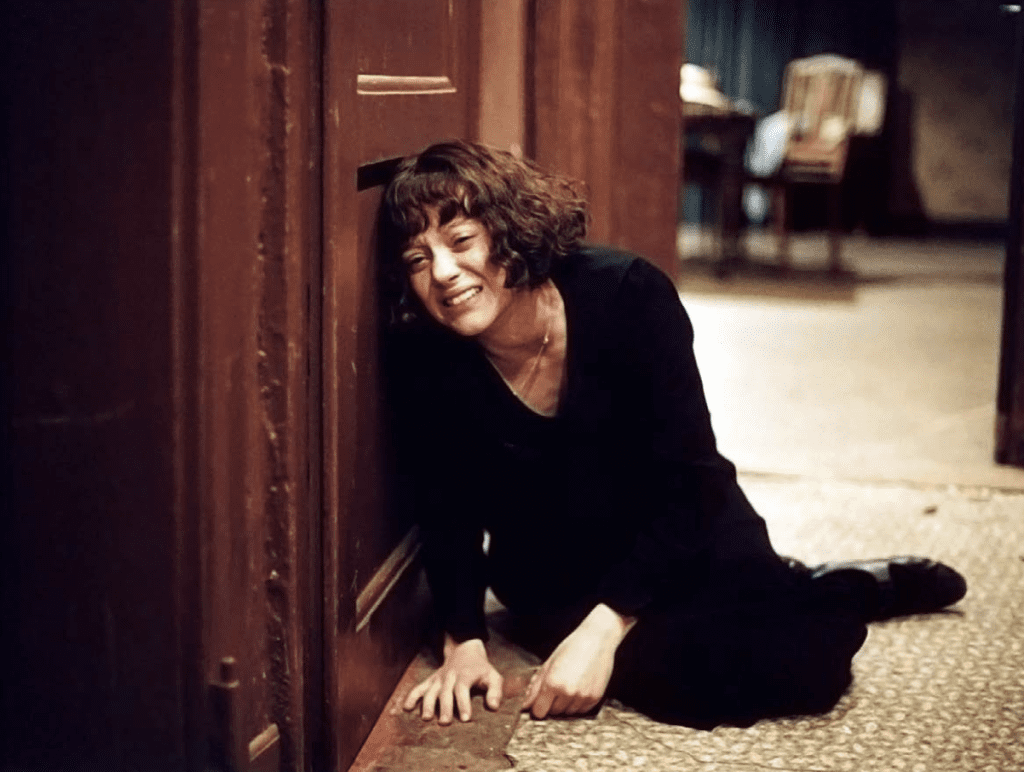
According to Edgar Morin, emblematic French philosopher and sociologist, stars are endowed with an ‘over-personality’—hybrid creatures built from a thousand facets. Goddesses of radiant perfection, shaped by the star-system itself, nourished by economic and cultural considerations.
Morin dates the disappearance of the stars to the passing of Marilyn Monroe, which would sound the death knell of a Golden Age. But despite a new era, the invention of new media, and more screens, the stars have not disappeared. Quite to the contrary, social media has created new, less fascinating monsters who trigger the same collective fervour as in the 20th century.
Where does Marion Cotillard come in this? As long as I’ve known her, the French actress is a link between the ‘old-fashioned’ stars—distant, with glamour—and those versatile versions of today, the global militants of environmental causes and muses of large luxury groups (for Cotillard, it’s Greenpeace, Dior then Chanel).
It’s a textbook case: a quintessentially Frenchwoman, perfectly integrated into a Hollywood heritage that was, a priori, not intended for her. Fate decided it. With Marion, myth goes hand-in-hand with reality—with Hollywood it was so far, but so close. French actresses (Cotillard is one of those who, like Binoche, resonate better with her native blue, white, and red) have an unequalled mark on international filmography.
Once upon a time, there was a little girl born in the 12th Arrondissement of Paris. Hers was a bohemian family, free and artistic to its fibre: both parents were actresses and drama teachers. Her mother Monique, renamed Niseema Theillaud would go on to teach at the Conservatoire d’Orléans. “Performing was always present. At home, we watched tapes of films with Greta Garbo and Charlie Chaplin and Catherine Deneuve over-and-over,” Marion tells me, “My parents transmitted this passion to me almost in spite of themselves. They were theatre actors. I watched them closely, fascinated when they acted, when they led workshops. Through their example, I also learned that setbacks happen, that nothing is ever easily won…” Marion, then, was much like all teenagers of her age. She didn’t love herself, she admits. She was an introverted young girl, struggling to find a place between her parents, who were often touring, and twin brothers: “I felt bad about myself. Resigned from everything—particularly myself. I had no friends nor boyfriends. I was excluded. When you don’t love yourself, others find it hard to love you.”
Like many actresses, salvation came from the theatre. It was a lifeline. As a fragile young girl, she rushed into the most destabilising profession there is. Why? “Human beings are made up of contradictions and paradoxes,” she explains, “I chose to confront what I feared most: judgement and competition.” At first Marion only chose to do monologues: “It was hard for me to work with others, but little-by-little I opened up to life.”
She followed her father’s advice to a letter (‘The gift is not enough. If you don’t work, the game is over’) and as a diligent nineteen-year-old, she won the First Prize at the Conservatoire d’Orléans. From that moment on, Marion Cotillard adopted a method to which she would return to: seek, understand, and never stop working: “I remember reading a Romy Schneider interview, who had an admirable, caring power, and it said something like, ‘I work on each role in fifty different ways, and even if the first is the correct one, she takes charge of the path for the forty-nine others’. That’s a sentiment I share, the construction and exploration of a character.”

Returning to Paris, she embarked on the same slavish cycle: bitter castings, modest projects, and odd-jobs. But luck knocked on her door in 1998. It was for Taxi, a Luc Besson production directed by Gérard Pirès. Not quite an auteur classic, it was filmed at full speed in Marseille and became a huge commercial success, seeing over six million cinema admissions. Although her role was decorative, it caught the eye of the public and won Marion her first César nomination for ‘Meilleur Espoir’ (or Best Hope). But was there life after the critically-acclaimed Taxi? Cotillard in 2000 was still a young emerging actress—expecting more from cinema. Already, there was a passion anchored in her body and soul, and that would soon become clear to the rest of the world. Then, as now, she was an actress of depth, of questioning and taking on challenges. But like all burgeoning careers, she admits there were moments of weariness, discouragement, and doubts that cloud the hope. After Taxi, and a few inconsequential films, her heart went. She tells me that she feared being categorised as dull girl-next-door characters in mainstream movies, and she considered stopping—refusing to continue with banal projects. Ever the environmental activist (Marion hadn’t waited for it to become fashionable among the stars to join the cause) she nearly quit acting to join Greenpeace. But she still feels the effects of those times: “The question of accomplishment, recognition and the acceptance of others recurs all throughout my life,” she explains. “It is a pathology, but also, in the long term, a means of reconciling with one’s ego and inner-self. All of the work I do today with myself is aimed at coming to terms with this. I want that recognition to come from me. Sometimes I get there. In my work, it’s more complex, as I’m very demanding, very hard on myself. Fame is often destabilising and doesn’t help matters,” she says. “When I finally received the Oscar, it was a moment to savour. That moment of recognition made me happy, but it’s never permanent. And the idea of competition unbalances me—I never experience it normally. As for ambition? That’s a word that has frightened me for a long time. But it’s not about stepping on others, it’s about going beyond your limits. Ultimately, it’s a good driver of energy.”
And so, providence manifested itself. Hollywood was ready: Tim Burton asked for Marion to star in Big Fish in 2003, an intimate fantasy film shot between Paris and Alabama. Like dominoes, one success led to another. Not long after, Jean-Pierre Jeunet casted her for a brief but unforgettable role in Un long dimanche de fiancailles, as a vengeful Corsican prostitute (a sort of killer black widow). Cotillard finally won the César for Best Supporting Actress—which must have felt like an act of revenge on the industry, even if she disagrees: “I knew I had the courage to lift myself when I was down, face refusals and rejections. But I’m not sure the word courage is appropriate when it comes to actors. You have to put things into perspective. True courage is being an activist, when you lead political or environmental fights, when you testify and actually put your life in danger,” she adds. Her real heroes are Pierre Rabhi or Wangari Maathai, among others: “I also think of actresses like Audrey Hepburn, who at some point refused to make films because she found a calling stronger than anything in her career.”
But in the mid-2000s, Marion was offered the role of a lifetime: Edith Piaf, the French musical icon adored in the US, and the immortal creator of ‘La vie en rose’, whose scintillating, painful life could be the subject of all the romance novels in the world. Marion won the role over Audrey Tautou, who instead embodied the post-Amelie Poulain Paris of the time. The film, La vie en rose, directed by Olivier Dahan, realistically portrayed the singer from her beginnings to her death in 1963, at just forty-seven years old—touching on her reckless loves, her passion for boxer Marcel Cerdan, and her addictions, triumphs, and agonies.

Marion’s physical shape-shifting, the transformation of her voice, and her commitment to this person, dazzled audiences. She didn’t choose to mimic, but rather to incarnate Piaf. And so America, always curious of great performance actors, opened up its arms to her. Suddenly, Marion found herself on the Oscar campaign trail. So inhibited and paralysed when it comes to playing as herself, she gave it everything. Her Parisian charm, and the refreshing candour typical of a French actress in Hollywood, made quite the impression. In February 2008, against Cate Blanchett, Julie Christie, Laura Linney, and Elliot Page, she won the Oscar for Best Actress—a feat only Simone Signoret and Juliette Binoche had achieved as Frenchwomen before her. A Golden Globe followed, then a BAFTA, and a César gleamed a little earlier. In a Jean Paul Gaultier dress, she gave one of the shortest speeches in Oscar history, thanking ‘Life, love and the angels in town.’
The Los Angeles angels took Marion under their wings. She was made for dramatic roles (sometimes called ‘an intense’ actress) but still possessed star quality—an intrinsically American form of alchemy that heralds a genuine star. Her love story with Hollywood began at that moment.
With her blue, melancholic eyes, and her delicate complexion, she was categorised as somewhat ‘exotic’, and yet belonging from the American technicolour movies of the 40s. She was an enchanting paradox: like Gene Tierney with a French accent. And she would continue working opposite La La Land’s most glamorous leading men: Johnny Depp (Public Enemies), Daniel Day-Lewis (Nine), Leonardo DiCaprio (Inception, and who, she says, became a friend for life) and later Brad Pitt (Allies). In the meantime, the most important directors cast her: from Steven Soderberg, to Woody Allen, James Gray, and Christopher Nolan. Her status sat between big Hollywood productions and European auteur films geared toward the Cannes Film Festival (Audiard and Desplechin), then travelling the world with ‘Jeanne d’Arc au Bûcher’ by Honegger—Ingrid Bergman and Isabelle Huppert portrayed the role before her—making music with the group Yodelice, and producing environmental documentaries. All of this serves to keep her grounded: “I have never identified with a set image of myself. My dramatic roles, magazine images, have all contributed to a distance, maybe even coldness I don’t recognise in me,” she says, “I belong to reality, and life is in continuous movement. We are swept away in a wave, everything moves and changes. Nothing is fixed or really gained, and it is like that for everyone.” She continues explaining that she prefers to keep healthy relationships: “I try to preserve some simplicity in a life that is not simple. In this journey, I’ve had the fortune to be surrounded by long, deep friendships; to share with them and follow their lives as they do with mine.” Friendship, Marion adds, “is crucial to my happiness. We must love each other, inspire each other, support each other, and laugh together.”
As the mother of two children, the artist is enjoying a new lease in middle-age: “For a long time, my roles took over and prevented me from living life to the full, especially as I rarely chose lighthearted stories. This was particularly true for La vie en rose and Macbeth,” she tells me, “There are two kinds of actresses: those who burn themselves out, and those who manage to put the character aside and come home in the evening. Today, I’m halfway there. Since becoming a mother, I have put boundaries to protect my children.”
Indeed last year, her pace of work has slowed down. Two projects were especially different: Annette, by Leos Carax, and an Asterix and Obelix film, a quirky big-budget blockbuster from her partner Guillaume Canet—a sort of Gallic ‘Power Couple’. In 2023, she returned to Los Angeles, where she acquired a home in Los Feliz. Extrapolations, an Apple+ TV series, was followed by Lee, a biopic on Lee Miller. She remains in the constellation of Hollywood’s finest actors, from Forest Whitaker to Kate Winslet. But Marion remains committed to understanding herself first: “Learning to love yourself is a way to live better with others. If we want the world to be better, we must start by looking at ourselves with love,” she tells me. It’s been a long journey, but she’s on the right path. Marion Cotillard has learned to love Marion Cotillard.



